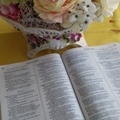[A devotional reflection originally prepared for the congregation of Horley Baptist Church during July 2024]
Those of us who follow the international news regularly will have noticed that the story of Ahab and Naboth recurs with almost daily frequency.[1]
The characters are different but the scenario is basically the same. A person in a position of power sees an adjacent piece of real-estate and decides that it would fit well within his own portfolio. He – or indeed, she – makes what they consider to be a reasonable offer for it and, if that is declined, then resorts to the use of deception, guile or blatant force.
The tenth Commandment addresses this matter directly:
“You shall not covet your neighbour’s house; you shall not covet your neighbour’s wife, or his male servant, or his female servant, or his ox, or his donkey, or anything that is your neighbour’s.”
Exodus 20 v17 [ESVUK]
Ahab had three options: he could suppress his greed and enjoy what he already had; he could co-operate with his neighbour so that both would benefit or he could take possession by force.
Ahab coveted his neighbour’s field; he killed to get it and was punished for his actions. David coveted his neighbour’s wife; he killed to get her and was punished for his lust. Achan coveted the treasures of a neighbouring city; 36 men died as a result and Achan was punished for his greed.
Where do we draw the line between admiring something, wanting something similar, coveting something that belongs to someone else and then setting out to obtain it? Do we allow ourselves to cultivate thoughts of how things could be different?
Historically in the Middle East, to admire something openly was tantamount to asking for it, a request that no diligent host would refuse. Diplomatic advice at the time was to be very cautious about what you say. It is sound advice that remains pertinent today. As long as we keep our thoughts to ourselves their impact is limited but once spoken the damage may be irreparable. The old adage holds true: ‘Least said, soonest mended’. Job was a bit more direct:
If only you could be silent! That’s the wisest thing you could do.
Job 13 v5 [NLT]
Later Ahab repented of his actions: God spared him but his family did not escape judgement.[2] We too can repent, ask for forgiveness and invite God to take control of our thoughts but the consequences of our actions remain.
As is often the case, the apostle Paul had some words of advice:
Finally, brothers and sisters, whatever is true, whatever is noble, whatever is right, whatever is pure, whatever is lovely, whatever is admirable – if anything is excellent or praiseworthy – think about such things.
Philippians 4 v8 [NIVUK]
References:
[1] 1 Kings 21
[2] 2 Kings 10
Bible quotations: Unless otherwise specified, quotations are taken from the resources of Bible Gateway or Bible Hub, in accordance with the licencing conditions outlined on our Site Policies page.
Bible dates:
Where appropriate, the dates given for Biblical events are based on the Bible Timeline resource
and are subject to the constraints defined on the corresponding webpage.
 Horley Baptist Church online
Horley Baptist Church onlineHBC main site
Confidential prayer link
Link to Recent Reflections
Link to Index of Bible Passages
Last week’s reflection: Down, Not Out
Contributed by Steve Humphreys; © Steve Humphreys

I can assure you I have never covetted my neighbours’ donkey! B. Thanks for your missives Steve.
Ah, but if you think of the donkey as representing his new car …